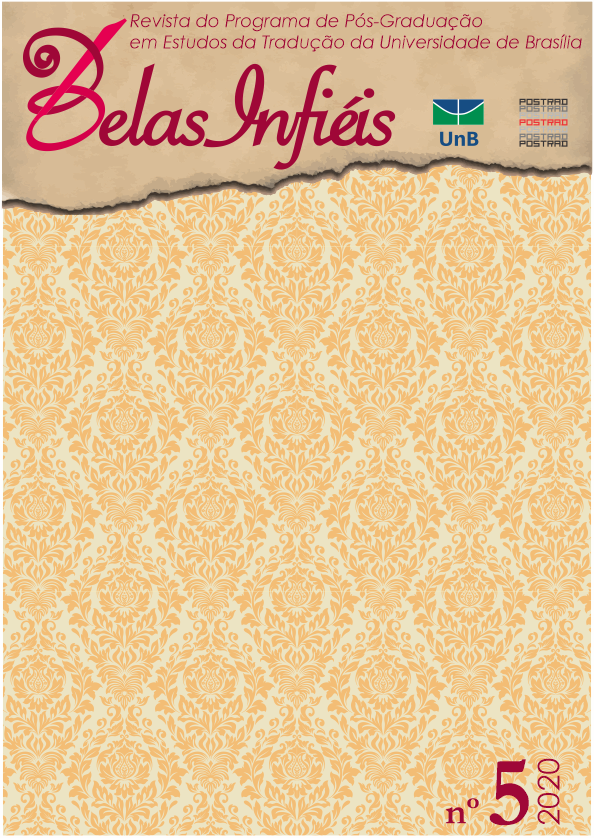Comment peut-on être sourcier ? Critique du littéralisme en traduction
DOI :
https://doi.org/10.26512/belasinfieis.v9.n5.2020.26640Mots-clés :
Literalidade. Estética. Ideologia. Criatividade literária.Résumé
La prise en compte de la traduction littéraire comme création pose d’emblée l’immémoriale question du littéralisme, qui oppose sourciers et ciblistes. Quand on traduit une œuvre littéraire, le théorème de dichotomie met en évidence le choix à opérer entre la spécificité ethnoculturelle (et linguistique) du texte original et l’esthétique littéraire qui est la sienne, et au sein de laquelle le rythme est un aspect parmi d’autres. Or il apparaît que l’accent mis trop souvent sur le décalage interculturel est plus ou moins surdéterminé par des impensés idéologiques. Mais la créativité littéraire de la traduction est un enjeu esthétique, et non pas idéologique. Cela dit, l’idée même de créativité est tendanciellement aporétique ”“ et ce, alors qu’elle est concrètement à l’œuvre dans les traductions de haut niveau.
Téléchargements
Références
BARTHES, Roland. Le Grain de la voix. Paris: Éditions du Seuil, 1981.
BERMAN, Antoine. L’âge de la traduction: la tâche du traducteur de Walter Benjamin, un commentaire. Texto estabelecido por Isabelle Berman, com a colaboração de Valentina Sommella. Saint-Denis: Presses universitaires de Vincennes, 2008.
DEL VALLE, Alexandre. Le Complexe occidental. Petit traité de déculpabilisation. Paris: Éditions du Toucan, 2014.
HAROUEL, Jean-Louis. La grande falsification. L’art contemporain. Paris: Jean- Cyrille Godefroy, 2009/2015.
KANT, Emmanuel. Critique de la faculté de juger. Traduzido por: Jean-René Ladmiral, Marc B. De Launay e Jean-Marie Vaysse. In: ALQUIÉ, Ferdinand. Œuvres philosophiques. Paris: Gallimard, 1790/1985. v. 2. p. 913-1299. [Bibliothèque de la Pléiade] Tradução de: Kritik der Urteilskraft.
LADMIRAL, Jean-René. Critique et métacritique: de Koenigsberg à Francfort ?. In: JACOB, André (org.). L’Univers philosophique. Encyclopédie philosophique universelle. Paris: Presses universitaires de France, 1989. v. 1. p. 700.
LADMIRAL, Jean-René. Le prisme interculturel de la traduction. Palimpsestes, Paris, v. 1, p. 15-30, 1998.
LADMIRAL, Jean-René. L’Esthétique de la traduction et ses prémisses musicales. In: MARSCHALL, Gottfried (org.). La traduction des livrets. Aspects théoriques, historiques et pragmatiques. Paris: Presses de l’université Paris-Sorbonne, 2004. p. 29-41. [Musiques/Écritures]
LADMIRAL, Jean-René. Della traduzione. Dall’estetica all’epistemologia. Organizado e traduzido por: Antonio Lavieri. Módena: Mucchi, 2009.
LADMIRAL, Jean-René. Traduire: théorèmes pour la traduction. Paris: Gallimard, 2010a.
LADMIRAL, Jean-René. Sur le discours méta-traductif de la traductologie. Meta, Montreal, v. 55, n. 1, p. 4-14, 2010b.
LADMIRAL, Jean-René. Esthétique de la traduction. In: BURON-BRUN, Bénédicte de; MIROUX, Franck (org.). Poétique & traduction. Reims: Presses universitaires de Sainte-Gemme, 2012a. p. 9-25. [Métaphrastiques]
LADMIRAL, Jean-René. Sourcier ou cibliste. Les profondeurs de la traduction. Paris: Les Belles Lettres, 2015. [Traductologiques]
LADMIRAL, Jean-René; LIPIANSKY, Edmond Marc. La Communication interculturelle. Paris: Les Belles Lettres, 2015. [Traductologiques]
LADMIRAL, Jean-René. Un tournant épistémologique au fondement de la traductologie? In: MONJEAN-DECAUDIN, Sylvie (org.). La traductologie et bien au-delà . Mélanges offerts à Claude Bocquet. Arras: Artois Presses Université, 2016. p. 303-315.
MALMBERG, Bertil. La Phonétique. Paris: PUF, 1964. [Que Sais-je?]
MEDHAT-LECOCQ, Héba; NEGGA, Delombera; SZENDE, Thomas (org.). Traduction et apprentissage des langues. Entre médiation et remédiation. Paris: Éditions des archives contemporaines, 2016.
MESCHONNIC, Henri. Pour la poétique II: Poétique de la traduction. Le Chemin. Paris: Gallimard, 1973.
MESCHONNIC, Henri. Critique du rythme. Anthropologie historique du langage. Lagrasse: Verdier, 1982.
MOUNIN, Georges. Phonostylistique et traduction. Revue d’esthétique, Paris, v. 12, p. 9-16, 1986.
RENGERVÉ, Muriel de. L’Affaire Richard Millet. Critique de la bien-pensance. Paris: Éditions Jacob-Duvernet, 2013.
WILHELM, Jane. Jean-René Ladmiral ”“ une anthropologie interdisciplinaire de la traduction. Meta, Montreal, v. 57, n. 3, p. 546-563, 2012.
Téléchargements
Publié-e
Comment citer
Numéro
Rubrique
Licence
(c) Tous droits réservés CC BY 2020

Cette œuvre est sous licence Creative Commons Attribution 4.0 International.
Copyright Statement
Given the public access to this journal, the texts are free to use but requires the recognition of the original authorship and initial publication in this journal to be properly stated.
The journal allows the use of works published for non-commercial purposes, including the right to submit the work to publicly accessible databases. Published contributions are the sole and exclusive responsibility of the author(s).
- When submitting papers to be evaluated by the Belas Infiéis journal, the author(s):
- Declare that the contents of the contributions are original and of their original creation, being entirely responsible for their content if there is an objection by third parties.
- Claim to be aware that they should not commit academic plagiarism.
- Declare that the manuscript has not been published, completely or partially, in Portuguese or another language. If it is a translation it should be submitted to the Translated Articles section.
- Declare that the manuscript is not being evaluated by other journals.
- Declare that the manuscript was not submitted to another journal simultaneously.
- Commit(s) to inform the journal of any kind of error or inaccuracy in their contribution (published, in evaluation or in editing) and to collaborate with the editors to make due corrections of the article (when in evaluation or editing) or erratum/retraction (after publication).
- Declare that there is no conflict of interest regarding the published work.
- Authorize its release if it is accepted for publication without any kind of monetary compensation.
- Agree to assign non-exclusive rights to publication to the magazine, remaining free to make their contribution available in other media as long as the publication of the first version in Belas Infiéis magazine is mentioned. They also authorize Belas Infiéis to assign their texts for reproduction in content indexers, virtual libraries and similar platforms.
- Maintain copyright and grant the journal the right of first publication, the work being licensed under theCreative Commons Attribution License.
- Is/Are allowed and encouraged to publish and distribute their work online after the editorial process, which may increase the impact and citation of the published work.
- Authorize the editorial team to make textual adjustments and to adapt the article to the publication rules, when necessary.



















